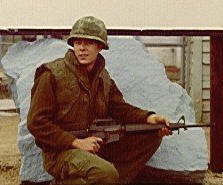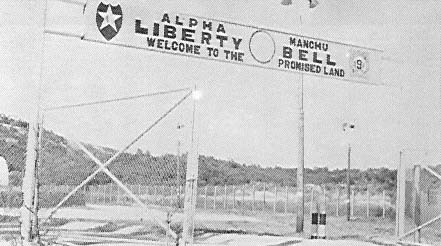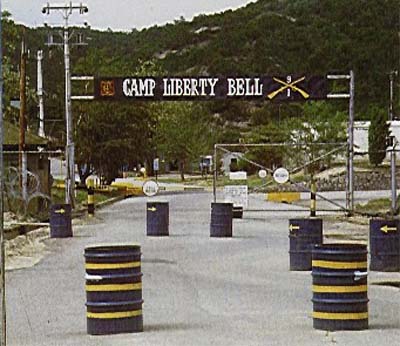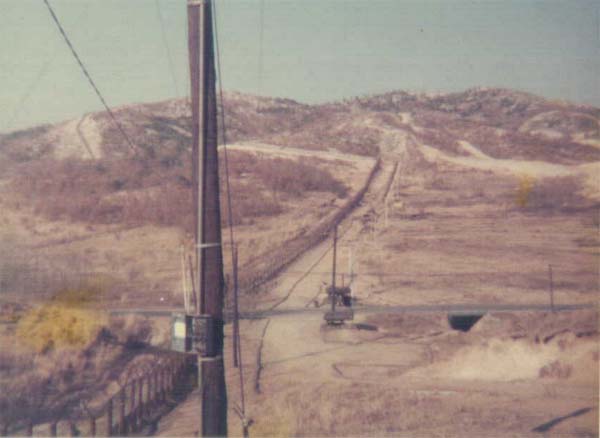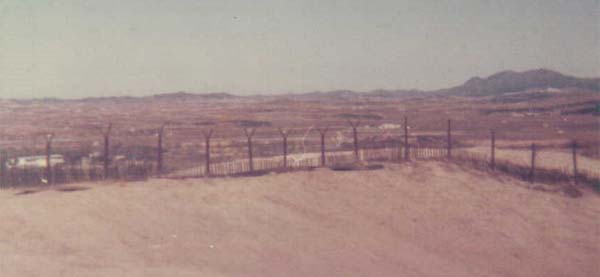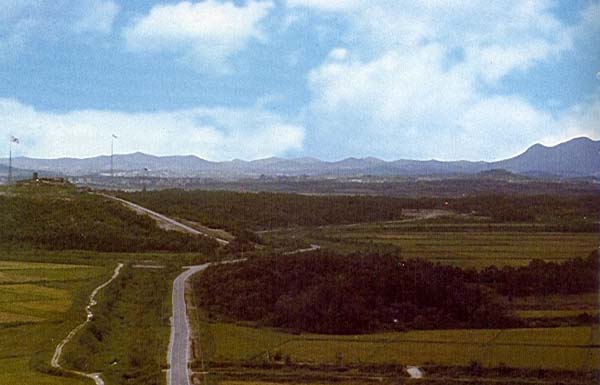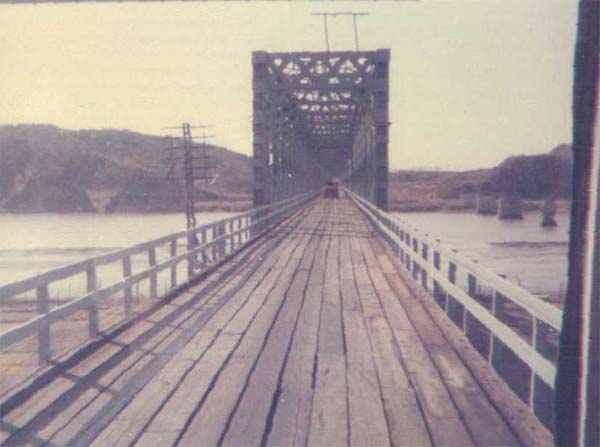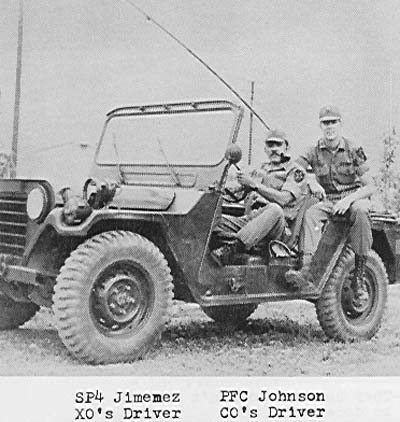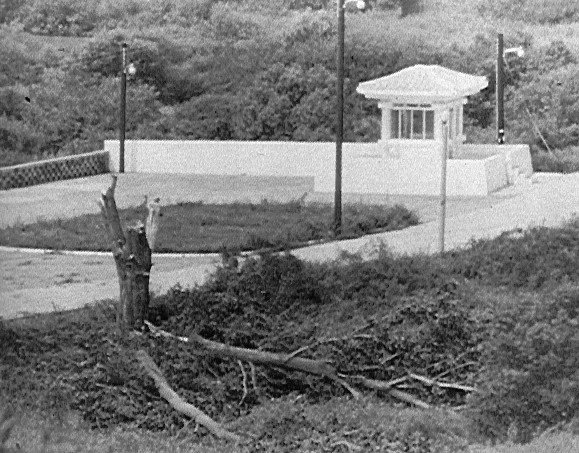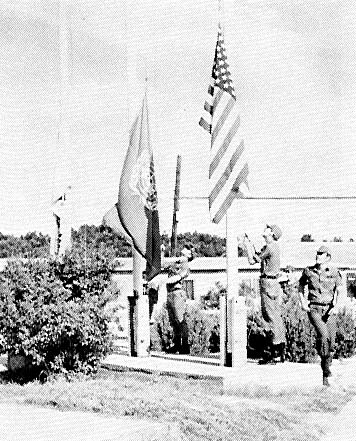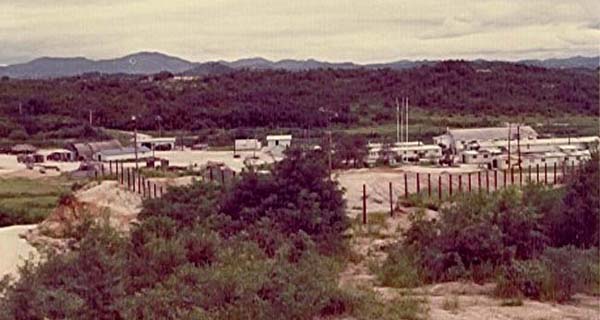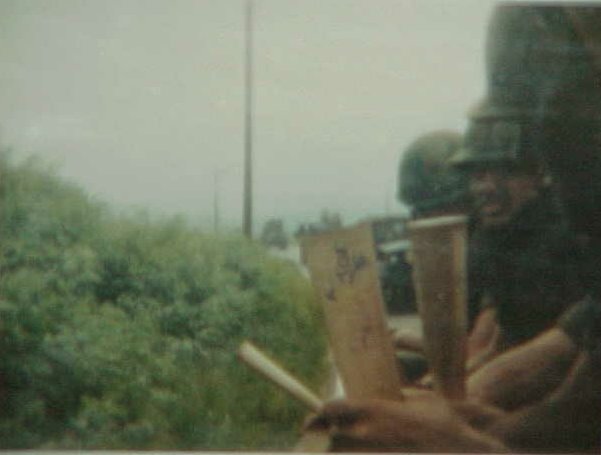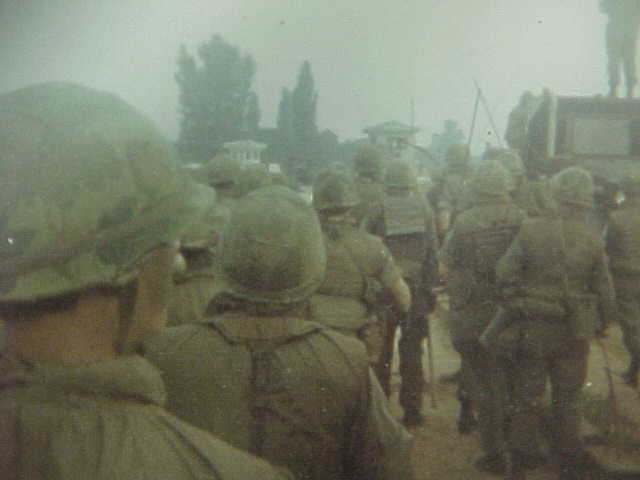|
We need your help to keep the KWE online. This website
runs on outdated technology. We need to migrate this website to a modern
platform, which also will be easier to navigate and maintain. If you value this resource and want to honor our veterans by keeping their stories online
in the future, please donate now.
For more information, click here.
|
|||||||||||||||
 |
|||||||||||||||
| Back to "Memoirs" Index page | |||||||||||||||
Wayne JohnsonAtlanta, GA "We had stood unarmed, save for the wooden axe-handles, in the face of the enemy a few hours before and the men had never blinked. We had won the day and I was quite proud to raise the flags above Camp Liberty Bell that morning. Post-Vietnam America was not very patriotic at that time. I just wish the citizens of the US could have felt what I did. It was a very good feeling to be proud of being an American." - Wayne Johnson |
|||||||||||||||
Memoir Contents:About the AuthorWayne Johnson joined the US Army in 1974 at the age of 17 under the delayed enlistment program. After Basic Combat Training and Advanced Individual Training at Ft Polk, Louisiana, Wayne was assigned to Company A, 2nd Battalion, 9th Infantry Regiment at Camp Casey, Korea in November of 1975. In March of 1976, Wayne's unit was transferred to Camp Liberty Bell and began patrolling the American sector of the DMZ. After Korea, Wayne was assigned to the US Army Reception Station, Ft. Jackson, South Carolina, where he remained until his enlistment expired. He returned home to Tucson, Arizona to begin his studies and his career. Currently living near Atlanta, GA with his wife of 23 years, Wayne works as an Information Technology consultant and spends much of his free time just working in the yard. Get the Flags UpThe murder of two officers assigned to the Joint Security Area (JSA) hit us like a bucket of cold water. True, we all understood that we were dealing with North Korean soldiers on a daily basis. True, North Korean soldiers were unpredictable. Yes, we all understood that there were risks. But the murders of CPT Bonifas and 1LT Barrett drove home the reality that this was serious business: deadly serious. To present a little background: Alpha Company, 2nd Battalion, 9th Infantry Regiment relocated from Camp Casey to Camp Liberty Bell in mid-March of 1976 and within days began patrolling the DMZ. The environments of Camp Casey and Camp Liberty Bell were as different as night and day.
Camp Casey was about 20 miles from the DMZ and there were several thousand soldiers located there: Infantry, Armor, Artillery, and Engineers. Camp Casey had a gym, a theater and even a radio station. By contrast, Camp Liberty Bell had barracks for one company of infantry, a platoon of heavy weapons (4.2 inch mortars), and a squad or more of radar operators for the ground surveillance radar located on a hill just outside of camp. Liberty Bell was located about 150 meters from the southern boundary of the DMZ and, other than an EM Club and dayroom, there was nothing else available to us. The nearest place to purchase toothpaste or shaving-cream was at Camp Kitty Hawk – literally across the street from us. Perhaps 50 meters closer to the DMZ (thus giving them bragging rights: "In Front of Them All"), Camp Kitty Hawk was home to the men who provided security within the Joint Security Area … commonly known as Panmunjom.
The DMZ mission proved to be quite exciting to most of us at "The Bell". There were days of absolute boredom mixed with periods of tense drama. Contacts, incidents, incursions, and infiltrators … these became part of our lives and soon became accepted as part of the job. We knew that it was dangerous; each and every one of us carried a weapon any time we were even near the DMZ. There was a platoon of men always armed at Liberty Bell and always ready to move to the DMZ in the event that there was trouble. This was our Ready Reaction Force (RRF) and they had to be moving within four minutes of receiving instructions.
On the 18th of August, 1976, the RRF heard the sirens from the JSA and prepared to move out. The JSA’s Quick Reaction Force had already been committed in Panmunjom, and the JSA was mustering another force to go into the DMZ. The RRF at Liberty Bell was on trucks ready to roll but never entered the DMZ. Then the waiting and the planning began. We had no idea what the North Koreans would do so ‘maximum effort’ was placed upon reconnaissance patrolling within the DMZ at that point. Every available man was needed and that included me. That night, nearly the entire company was inside of the DMZ and we were ready for about anything, but there was nothing unusually "aggressive" about our patrols except for the number of men. We set up in areas that I thought were appropriate in light of the murders at Panmunjom earlier that day. The group that I was part of was operating west of the road leading to Panmunjom about 100 meters from the Military Demarcation Line (MDL). NOTE: The MDL is the actual dividing line between North and South Korea. It runs directly through the center of the DMZ from the west coast to the east coast of Korea. Approximately two kilometers North and South of the MDL mark the DMZ.
All of the recon-patrols reported back without making contact of any kind that night (18 August 1976). My group made it back by about 0400 and I was in bed by about 0415. At 0430, the entire company was active … we had been placed on alert status. Sleep had just become a rather rare commodity for everyone and would continue to evade most of us for a few more days. Three months earlier I had been reassigned from the third platoon to be the new Commanding Officer’s driver. CPT Harvey S. Browne had been with the 2nd Battalion 9th Infantry for over a year. Previously, he had been assigned as the battalion S-4 officer and was permitted to extend his tour for another year so that he could command a company. For the next three days CPT Browne, company commander of Alpha, 2/9th, was required to be in several places at once and my job was to get him to each and every place he needed to be. There were several briefings held which laid out exactly what had happened, what was now being done, and just what the US response was planned to be. Then there was the memorial service for the two murdered officers. Back to Camp Liberty Bell to brief the company XO and the Platoon leaders. There were more briefings at battalion headquarters, followed by more briefings at Liberty Bell and the JSA. There were several ROK units in the area near Liberty Bell, and CPT Browne needed to coordinate with these units as well. This man amazed me. While he was in a meeting I was sometimes able to get 40 winks or so but neither of us slept much. I would see his eyes close while I was driving but that wasn’t at all restful. He just kept going! And that inspired me to do the same. I wasn’t about to let him down.
One thing that happened quickly was that the "rumor mill" went into high gear. For some reason, most of the men thought that I might know something. As soon as the CO and I would arrive back at the camp, and he would begin briefing his officers, the enlisted men would begin asking me what was going on. At first, I wouldn’t say what I knew. Not that I knew much, but I just wasn’t sure just who was suppose to know it. I also felt that the platoon leaders might be able to do a better job of spreading the word. Later, however, I told CPT Browne about what was happening and he would brief me during the drive back to Liberty Bell on what information was OK to tell the men. This proved to be very helpful in easing a lot of worries, and it showed me just how concerned he was about his men. CPT Browne was quite open about the pending operation. The Tree was going to be cut down. Alpha Company was going into Panmunjom to help make sure that it was cut down and to protect the men that were going to be doing the cutting. In case the North Koreans had any ideas, we were there to make them think twice. But there was one problem. We were going in "unarmed" with just wooden axe handles. The only thing left was for the ‘higher ups’ (Washington) to approve the plan. As open as Captain Browne was with us, it was still chilling when he told the XO, 2LT David K. Bethea, "Keith, break out the basic load." All of the men of Alpha Company were ready for the assigned mission. There was a word or two about the
"unarmed" part of it, however. True, the men of the JSA would have their side arms. Yes, there would be a company
of heavily armed ROK soldiers in plain view just outside of the JSA limits. True, there would be more than 20
helicopters carrying the heavily armed men of Bravo Company orbiting just out of sight. But we were infantrymen
and had been taught from first day of our basic training to maintain a special relationship with our weapons. And
now we were being told to leave them behind. Command wanted to try to stay within the terms of the truce, and they
were already planning on violating the five officer, 30-man limit by about 300 or more men. Automatic weapons were
not permitted in the JSA and command did not want to ‘provoke’ anything. But make no mistake about it, we were
told. If even one shot was fired, we were "going north" -- WAR. And we had the firepower behind us to back it up,
including at least three B-52 Stratofortress bombers loaded for bear. By 0430 on the morning of the 21 August 1976, we were up and moving. This was THE morning--quite possibly the last morning of peace in Korea for some time to come. Some of us might never see another. A light drizzle was falling on us that morning as I remember, but it soon stopped. Everyone was preparing for our mission by the headlights of the vehicles that were lined up on the main avenue and between the arms room and the mess hall. Each of the company’s 2 ½-ton trucks were being readied for the trip north. Gamma goats and jeeps were also being prepared for the mortar platoons. My jeep was being loaded with radios, rations, and other equipment that might be needed. A layer of sandbags was being place on the bed of the truck to stop shrapnel in case the vehicle was to roll over a mine. But something else was going in the truck, too. More sandbags. They were being stacked 2-3 high and about 2 feet wide forming a trough in the middle of the truck bed. This trough was then being stacked with weapons and ammunition. Tarps, rucksacks, and ponchos were being placed over everything to conceal the weapons that were to go north with the men. Each man received his basic load of ammunition as well and carried that ammunition with him. In case fighting was to break out, one would have to make it back to a truck, grab a weapon, and return fire. At least this provided us a chance. I don’t remember if breakfast was prepared. I don’t remember eating. My guess is that we were given C-rations for breakfast and lunch, but that is only a guess. I just don’t remember. It was still pretty early, however, when the men loaded into the 2 ½-ton trucks and headed north. Probably 0630 to 0645 hours. Not everyone left Camp Liberty Bell. The Four-Deuce mortar platoon stayed behind to provide fire support. Their mission wasn’t that much different than normal. They were always at the ready to provide fire support within the DMZ. They did have help this time. The weapons platoon also stayed behind. They had a dual mission. In case fighting broke out, they were to move to pre-designated positions, fire their ordnance, and then head towards Libby Bridge (Freedom Bridge would probably be a heap of iron in the Imjin River by then) and cross the Imjin River.
I was ordered to stay behind to help rig the camp for destruction and then to join the rest of the company at Panmunjom when that was done. Just inside the door of each building, we placed a five-gallon container of either diesel fuel or MOGAS (Motor Gasoline) while opening doors and windows for ventilation. We also had about 30 thermite grenades. They burn very hot and are used to melt equipment such as mortar tubes, engine blocks, and artillery pieces. At the first sound of gunfire, the camp was to be ignited. Everything of use was to be destroyed. After all of the fuel cans were set up, thermite grenades positioned, and plans for ‘liberating’ as much liquor and tobacco as possible from the EM Club drawn up, I drove 2LT Clark to the various positions so that he could inspect the set-up. Once he was satisfied that all was well, I took him back to the main avenue of Liberty Bell where the weapons platoon was waiting, and then I headed north to join the rest of the company. Having a jeep was a tremendous responsibility at the time, but with it there was tremendous freedom … I wasn’t tied down to a specific location and therefore, I could be used in various roles, including my primary role as driver and RTO for the company commander.
I do not remember much about the drive north. I don’t remember going through the JSA gate nor do I remember going through the gate at the barrier fence. I could not tell you if these positions were manned or not. But I do remember getting to Panmunjom and covering my weapon with a poncho. The company had already been deployed within Panmunjom in riot control formation (something that had been practiced many times that summer due to student unrest in Korea as well as this current situation). Operation Paul Bunyan was well underway. I did not join the company, but stayed back with the trucks and the weapons. From my position, if fighting started I could do the most good by grabbing a weapon and laying down covering fire. I might even be able to get a few weapons to the others a little quicker than if they had to run all of the way back to the rear of the trucks. In my mind I had already decided what weapon to use and where to fire. Thankfully, the North Koreans were caught totally by surprise! There were dozens of them running around, but there didn’t look to be any leadership that I could see. This was far different than what was happening on the "southern" side. (Note: Due to the layout of the Joint Security area, the "Bridge of No Return" is actually oriented east/west and this bridge was the only entrance from North Korean into Panmunjom.) The UN, ROK, and American units were the proverbial "well-oiled machine". Everything was rehearsed and perfectly executed. The tree was cut down and all men withdrew from the area towards CP2 near the southern entrance to Panmunjom, but not before having a little fun with the North Koreans. Alpha Company , 2/9th, double-timed all of the way to CP3, near the "Bridge of No Return," chanting "Manchu, Manchu, Keep Up the Fire" (the regimental nickname and motto).
I saw that I was going to be in the way as everyone left, so I drove the jeep south near the entrance to GP Ouellette. Not long afterwards, Alpha Company withdrew from Panmunjom and took cover between two hills just outside of Panmunjom not far from where I had driven. Weapons were now distributed and the men were very alert to the possibility of trouble from North Korean troops. We were no longer in Panmunjom. This was the DMZ-–our domain. Though hidden from view, three platoons of heavily armed infantry were now ready to meet any trouble that might erupt, and this time we had more than just axe handles. GP Ouellette occupied the hilltop above us. Quite a formidable force! Probably two hours passed before anyone started to relax. About two-thirds of the men were actually sitting down and leaning against some of the gear that was on the ground. The sun had come out and many of the men were napping in the morning sun. It had been a long three days and everyone was exhausted. For some, it was time to catch a little sleep. But, once again, CPT Browne was called to attend a briefing. Maybe ‘debriefing’ would be more accurate. We got in the jeep and headed south leaving the XO in command. The time was about 1000 hours. When we broke into view of Camp Liberty Bell, CPT Browne immediately noticed that the three flagpoles were
barren. We had no idea if the camp would even exist by mid-morning, so we never raised the US, Korean, or UN
flags. Instead, they had been tucked away in one of the vehicles so that they would not fall into enemy hands.
That morning, a few mortar men and I raised the flags above Camp Liberty Bell. We had stood unarmed, save for the wooden axe-handles, in the face of the enemy a few hours before and the men had never blinked. We had won the day and I was quite proud to raise the flags above Camp Liberty Bell that morning. Post-Vietnam America was not very patriotic at that time. I just wish the citizens of the US could have felt what I did. It was a very good feeling to be proud of being an American.
|
|||||||||||||||
|
|||||||||||||||
 |
|||||||||||||||


